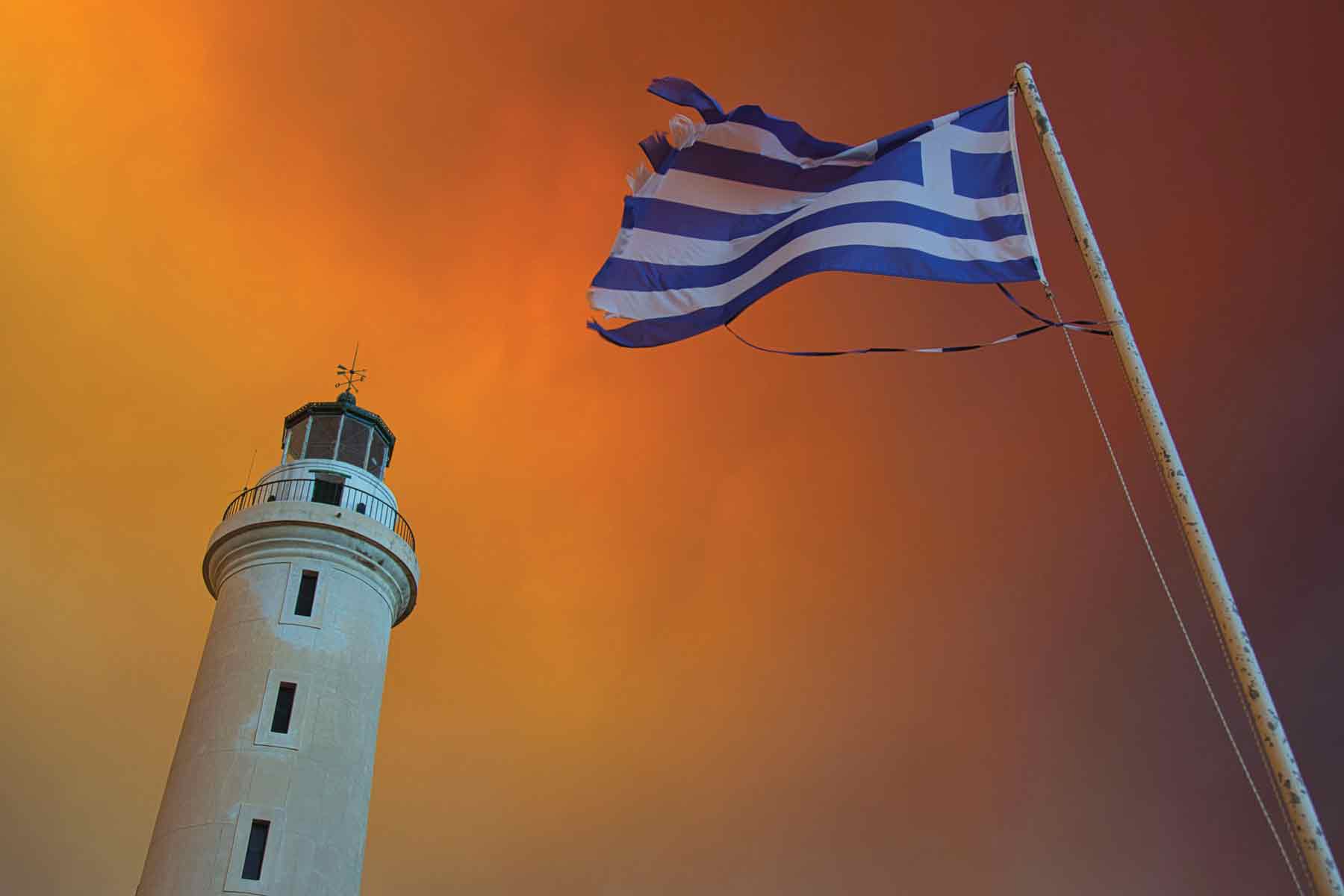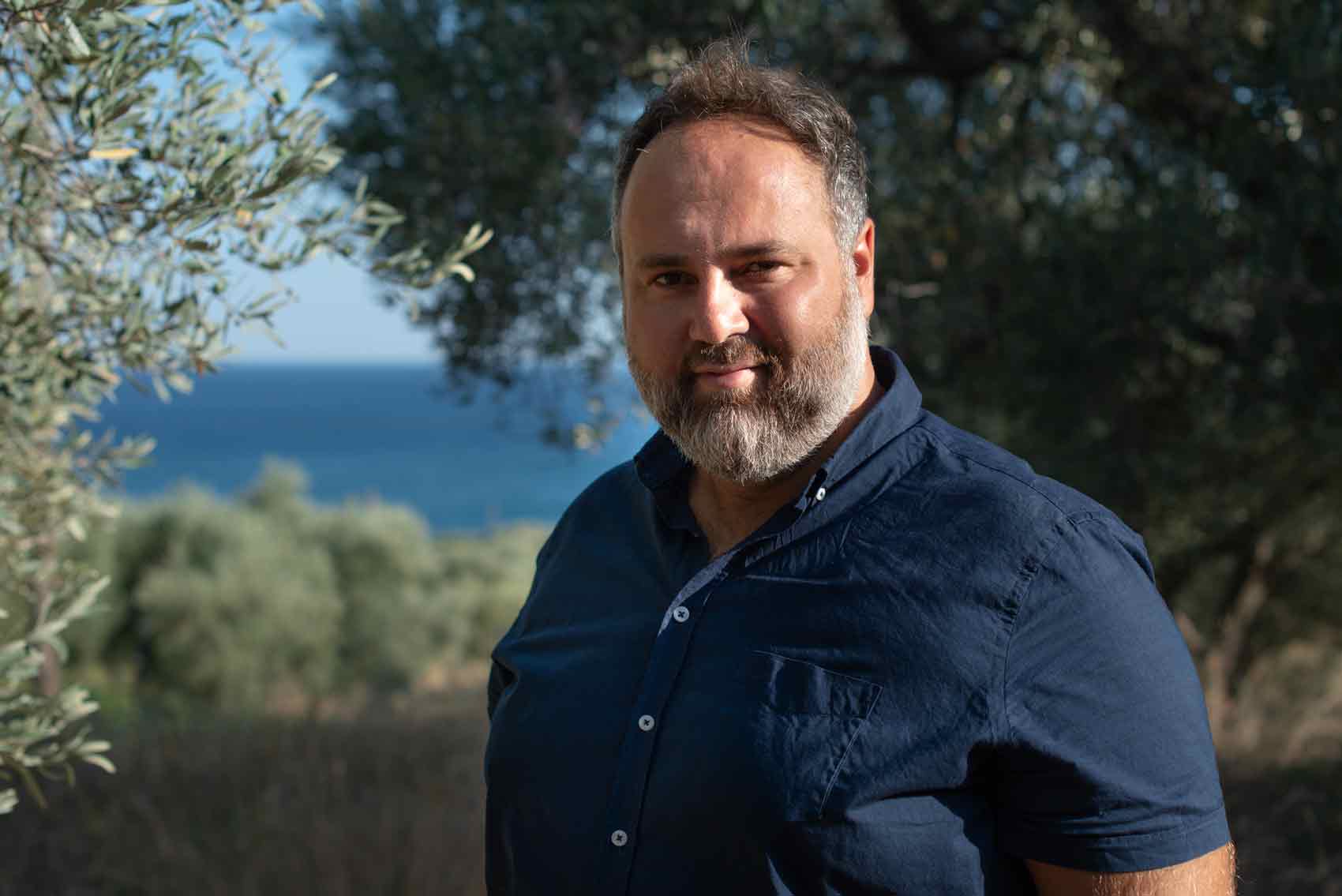Pavlos Georgiadis is tense. He’s recalling the events of 22 August 2023 in Makri. He should have been enjoying a holiday with his family at their home in the Greek village, but instead, he was volunteering at the local communal office. As wildfires spread, he posted on social media to keep locals abreast of the unfolding situation, and helped to design a strategy for the next morning. But there was no time to put the plans into practice.
At about one o’clock in the morning, he realised the fires were approaching faster than expected. He rang his pregnant wife and told her to pack a few essentials, get the car ready, and escape to their second home in the nearby city of Alexandroupoli, capital of the Evros region in north-east Greece. Along with his mother, Georgiadis’s wife and their young son managed to leave just before a lengthy traffic jam formed. When Georgiadis eventually left Makri to join his family, it took him one and a half hours to drive the 10km journey.
The 42-year-old’s work as an international biodiversity and ecosystem restoration expert has taken him all over the world. He is currently based in Germany but he grew up in Evros, and the Greek mountains and forests in which he once walked and found inspiration are now burned. His extended family runs an olive oil business and, that night in August, they lost more than a quarter of their olive trees to the inferno.

What Georgiadis and his relatives witnessed was the largest wildfire in Europe since records began in 2000. According to a European Union official, the megafire decimated more than 96,000 hectares, an area bigger than the Berlin metropolitan region, and killed at least 20 people. The fires mostly affected Greece’s biggest Natura 2000 site, the Dadia National Park in Evros. Yet this protected area was not the only area to go up in flames. Over the summer, among others, the Attica region and the holiday islands of Rhodes and Corfu were hit.
But the Greek firefighters were not left alone. The EU came to their aid in what a press release from 29 August 2023 describes as its biggest “rescEU” aerial firefighting operation. According to an EU official, eight aeroplanes operated in the Alexandroupoli region, while four planes and one helicopter were used in the Attica region near Athens. Additionally, Bulgaria, Cyprus, Czechia, Romania, Slovakia and Serbia provided ground teams to fight the forest fires.
Overall, the June to August season of 2023 was the warmest on record globally by a large margin, according to the Copernicus Climate Change Service. At the same time, the burnt area in the EU countries (482,866 hectares) was 40 per cent above average.
Sadly, the outlook for this year is not rosy. According to Kostis Grimanis, an Athens-based climate and energy campaigner at Greenpeace, forecasts regarding the global temperature rise for 2024 are worrying.
“Reports make mention of an up to 1.4C increase in the Earth’s temperature. If true, this will have devastating consequences for the Mediterranean, which is often referred to as a climate change hotspot and is warming 20 per cent faster than the global average,” Grimanis explains. Last summer, a fire broke out two kilometers away from his house on the island of Zakynthos.
A fire that might break out again next summer. Following the flames and then the floods in Thessaly in northern Greece, the opposition party, Syriza, criticised Greek prime minister, Kyriakos Mitsotakis’s (New Democracy) extreme weather management. And Syriza is not the only dissenting voice. According to Georgiadis and Grimanis, the government’s prevention measures remain insufficient – in fact, Georgiadis speaks of a “state failure”. After all, the 2023 wildfires weren’t the first the country has seen.
“Nothing has happened in the direction of establishing a credible plan for climate adaptation or forest fire prevention, so I would not expect that, through some magical way, we are in any way protected from a new blaze,” Georgiadis tells The Parliament.
If 2023’s fire was too difficult to contain, then it will become even more difficult
Moreover, it is a misconception that, after everything is burned, the fire hazard disappears, since flammable material remains inside the forest. Georgiadis predicts the highest risk comes after three to five years – by then, the vegetation structure of the burned lands will be highly altered. “With fewer trees and more grasses, a potential fire will spread at a much higher speed than last summer,” he says. “If 2023’s fire was too difficult to contain, then it will become even more difficult.”
On top of that, the climate crisis exacerbates existing problems. As Grimanis explains, one major issue is poor forest management. According to the climate and energy campaigner, the country still hasn’t fully implemented regional adaptation plans. “For decades, the National Forestry Service has suffered from severe underfunding and lack of a proper management plan for wildfire prevention.”
According to Georgiadis, the Forestry Office of Soufli, responsible for managing the badly hit Dadia Forest National Park, for instance, has no foresters and only four forest technicians. Moreover, communities lack trained firefighting teams.
The poor forest management practices also resulted in significant amounts of dry biomass which had not been cleared out when last year’s fires hit. “If you have a deadly heatwave like the one we had in Europe in the summer of 2023 and you do nothing to clear away the dry biomass in advance, you’re increasing your chances of the fires breaking out and endangering the lives of animals, people and ecosystems,” Grimanis says.
At the end of August 2023, Mitsotakis took to X to announce 10 measures for early warning and intervention as a response to last year's fires. They include placing temperature measurement sensors and cameras on archaeological sites and in high-risk forests, recruiting 1,000 firefighters and 500 foresters, and the reforestation of 165,000 acres in the next two years.
“In the absence of a comprehensive climate adaptation policy, the Greek government is introducing piecemeal interventions, framing them as a war against nature – a battle it is likely to lose,” Georgiadis argues. “This strategy falls short of providing a systematic solution for long-term fire prevention and the prevention of desertification in Greece.”
Another government response has been the establishment of a commission for drawing up a special development programme for Evros. Its aim is, among other things, the regeneration of the forest areas, especially of the precious Dadia Forest, as well as the creation of a plan for tourism promotion.
But Georgiadis is not convinced. Of the 16 members only two, he says, are natural scientists. “In reality, all of them are connected to the government party; this is how things go in Greece,” he says. No restoration ecologists or wildlife biologists are represented – and no locals are involved. “This is against the European Green Deal thinking of leaving no one behind,” he argues.
 International biodiversity and ecosystem restoration expert Pavlos Georgiadis. Photo by Theophilos Gerontopoulos
International biodiversity and ecosystem restoration expert Pavlos Georgiadis. Photo by Theophilos Gerontopoulos
In September, Mitsotakis also promised, after the wildfires and floods in Thessaly, to fight the “climate war”. Yet, Grimanis finds this pledge contradictory as the country still heavily invests in fossil fuels. He deems the efforts to mitigate the climate crisis to be insufficient. A report by the International Energy Agency from April 2023 confirms that, despite progress in the energy transition, stronger actions are required to bring down Greece’s dependence on fossil fuels.
The Greek government did not respond to The Parliament’s questions regarding the experts’ criticism and prevention measures.
On a European level, it remains to be seen if Brussels has learnt its lessons from the largest fire recorded. “The forecast of the European Environment Agency is a clear wake-up call, that even in a best-case scenario of a 1.5C warmer world, we need to radically adapt our firefighting capabilities. It is clear that we should invest more in protecting forest lands and biodiversity,” Greek MEP Petros Kokkalis (The Left group) writes in an email to The Parliament.
“Last summer’s fires exposed several bottlenecks, which means that we must raise the ambition of our policies to ensure that we deliver viable futures to every European citizen, especially in the most remote and socio-economically challenged regions like Evros,” the member of the environmental committee adds. Additionally, there needs to be “a systematic European approach to adaptation to protect forests and prevent wildfires from occurring in the first place, instead of just focusing on extinguishing them”.
His colleague, German MEP Jutta Paulus (Greens/EFA) also believes that a strong European crisis response is crucial in extreme weather events. “At the same time, Europe must build resilience and better adaptation to the climate crisis. By restoring nature, the effects of extreme weather can be softened,” she writes in an email.
One measure is the New Nature Restoration Law which seeks to bring back ecosystems, habitats and species across the EU’s land and sea areas. Trilogue negotiations have ended, and the European Parliament will vote on the new EU Nature Restoration Law in February.
Despite his experiences during that dramatic summer night in Makri, Georgiadis has his heart set on returning to his home in the greatly affected area of Evros. “I have to. And not only during the summer holidays; I’m hoping that I will have some involvement as a researcher,” the expert says. “People need to understand the complexity.”
Sign up to The Parliament's weekly newsletter
Every Friday our editorial team goes behind the headlines to offer insight and analysis on the key stories driving the EU agenda. Subscribe for free here.